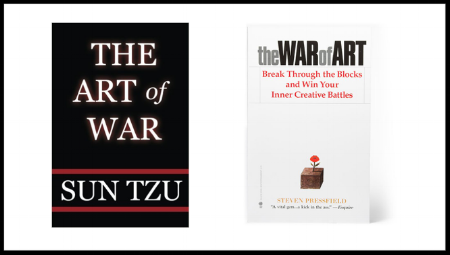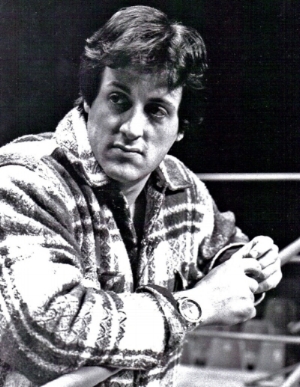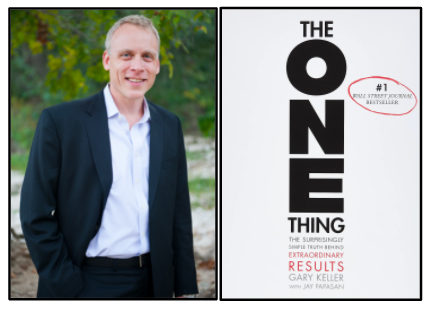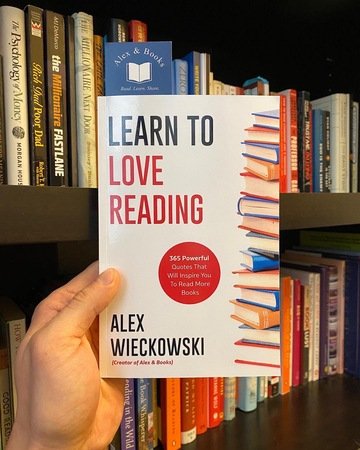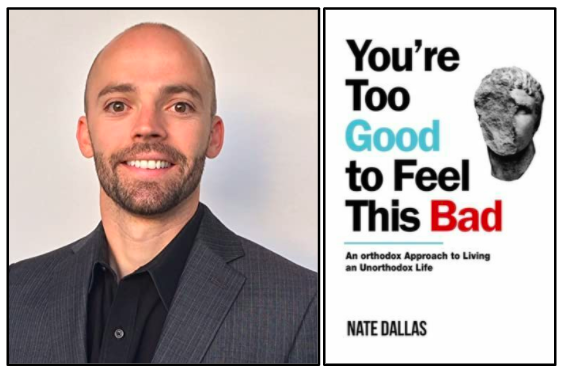Almost everyone has heard of the book The Art of War; the famous strategy book about winning military battles. However, there is a great book by a similar title; The War of Art, that is about winning creative battles.
Two fantastic books. To read my article on The Art of War, click here.
If you’ve ever wanted to write a novel, become an artist, start a business or run a marathon, then I’d recommend reading The War of Art by Steven Pressfield. Pressfield is a bestselling author and screenwriter who knows a lot about winning creative battles.
This book shows readers how to identify, defeat, and unlock the inner barriers to creativity. Here are 3 lessons learned from The War of Art:
1) Define The Enemy
Pressfield begins the book by telling readers a secret:
“There’s a secret that real writers know that wannabe writers don’t, and the secret is this: It’s not the writing part that’s hard. What’s hard is sitting down to write. What keeps us from sitting down is Resistance.”
Before I began typing this article, I faced Resistance. I told myself I’d start writing right after eating breakfast. I made myself a large bowl of oatmeal. This filled me up, but for some reason, I decided to cook an egg afterward. Then I had a craving for a bagel, so I walked down to the deli to get one. Even though I was full after eating oatmeal, for some reason I kept putting off starting this article. This is exactly what Resistance does to people.
Resistance is what prevents people from achieving their goals and living a fulfilled life. It stops writers from writing, painters from painting, and entrepreneurs from starting a new ventures. If you’ve ever bought a treadmill or workout gear from your home and never used it, you’ve encountered Resistance.
Resistance comes in many shapes and forms. It is an invisible and repelling force. It’s negative and tries to distract and prevents us from doing our work.
Resistance has many faces.
“In other words, any act that rejects immediate gratification in favor of long-term growth, health or integrity. Or, expressed another way, any act that derives from our higher nature instead of our lower. Any of these will elicit Resistance. ”
As mentioned before, Resistance comes in many forms. Sometimes it takes the shape of anxiety or nervousness. Pressfield writes about Henry Fonda, the American film and stage actor with a career spanning five decades. Henry would throw up before each stage performance, even when he was 75 years old.
“In other words, fear doesn’t go away. The warrior and the artist live by the same code of necessity, which dictates that the battle must be fought anew every day. ”
Another common form of Resistance is procrastination. We end up convincing ourselves that we will do something, but just not today. We don’t say, “I’m never going to start my novel.” Instead, we say, “I’m going to write my novel; I’m just going to start it tomorrow.” And as we all know, tomorrow almost always means never.
Resistance can also be associated with fear. Pressfield says that fear is good because it can be used as an indicator of what we should be doing.
“Remember our rule of thumb: The more scared we are of a work or calling, the more sure we can be that we have to do it[...]If it meant nothing to us, there’d be no Resistance. ”
Author Steven Pressfield.
2) Combating Resistance
Now that we’ve identified the enemy, it is time to find ways to defeat it. Pressfield says that one of the first steps people must take is going pro.
“The amateur plays for fun. The professional plays for keeps. To the amateur, the game is his avocation. To the pro it’s his vocation. The amateur is a weekend warrior. The professional is there seven days a week. ”
Turning pro means you’re willing to commit. If you want to start a business or write a novel, you need to commit to the process. This is a difficult hill for most people to get over because they know that once they get to the other side, they will encounter a mountain of pain.
“The artist committing himself to his calling has volunteered for hell, whether he knows it or not. He will be dining for the duration on a diet of isolation, rejection, self-doubt, despair, ridicule, contempt, and humiliation. ”
Although war can be hell, Pressfield provides 10 principles to help us win this war:
1) We show up every day.
2) We show up no matter what.
3) We stay on the job all day.
4) We are committed over the long haul.
5) The stakes for us are high and real.
6) We accept remuneration for our labor.
7) We do not overidentify with our jobs.
8) We master the technique of our jobs.
9) We have a sense of humor about our jobs.
10) We receive praise or blame in the real world.
Pressfield, a former marine, knows that war can be tough. It took him 17 years to get his first professional writing job. He worked on a major film and believed it would be a blockbuster hit. Unfortunately, it fell flat. Pressfield knew that this was the price he had to pay for being in the game. He made the decision to not give up and keep working. This was the moment he realized he had become a pro.
Sylvester Stallone fought Resistance and won. His film, Rocky (1976) won 3 Oscars.
Another screenwriter that didn’t give up, was Sylvester Stallone. After writing the script for Rocky, he received several large offers for it but turned them down because he also wanted to play the main character. Eventually, Stallone managed to find a studio that bought the script and allowed him to play the part of Rocky Balboa.
Stallone faced rejection multiple times before he won his war with art. Likewise, most artists will face similar hurdles. The war of art is filled with rejection and criticism.
When we get rejected we feel it in our gut. The pain, although mental, feels like a punch in the stomach. Pressfield writes about a friend who worked on a novel for years and after finishing it, couldn’t find the energy to send it. His fear of rejection held him back. Resistance uses fear of rejection to paralyze and prevent us from doing our work, and then from showing it to others.
“The professional cannot take rejection personally because to do so reinforces Resistance. Editors are not the enemy; critics are not the enemy. Resistance is the enemy. The battle is inside our own heads. We cannot let external criticism, even if it’s true, fortify our internal foe. ”
To win the battle with Resistance, the professional must be open to criticism. Use it to learn and grow. Detach your ego from your work and seek constant feedback to improve your craft.
3) Beyond Resistance
If you’re still having trouble with Resistance, Pressfield offers a final thought to help win the war. First, ask yourself, what you were put on this earth to be? Are you meant to be an artist, a scientist or perhaps a diplomat? And what would happen if you didn’t pursue your destiny?
“If you were meant to cure cancer or write a symphony or crack cold fusion and you don’t do it, you not only hurt yourself, even destroy yourself. You hurt your children. You hurt me. You hurt the planet. ”
J.K. Rowling was rejected several times before she finally got her book published. She was 32 when the first Harry Potter novel was released. Reid Hoffman had a Ph.D. in Philosophy and worked in academia. It wasn't until he was 36 that he founded LinkedIn.
Both of these individuals made significant contributions to the world. Imagine if you were destined to make the next positive impact but you let Resistance hold you back.
Gandhi started his career as a lawyer. If he had remained a lawyer, who knows if India would have become an independent country.
Pressfield ends his book with the following paragraph:
“Creative work is not a selfish act or bid for attention on the part of the actor. It’s a gift to the world and every being in it. Don’t cheat us of your contribution. Give us what you’ve got. ”
Thank you for reading my article. These are just a few lessons from The War of Art. To learn more, click the button below.
If you enjoyed this article, consider supporting our site or signing up for our monthly newsletter. Thank you!
Reader freebies:

